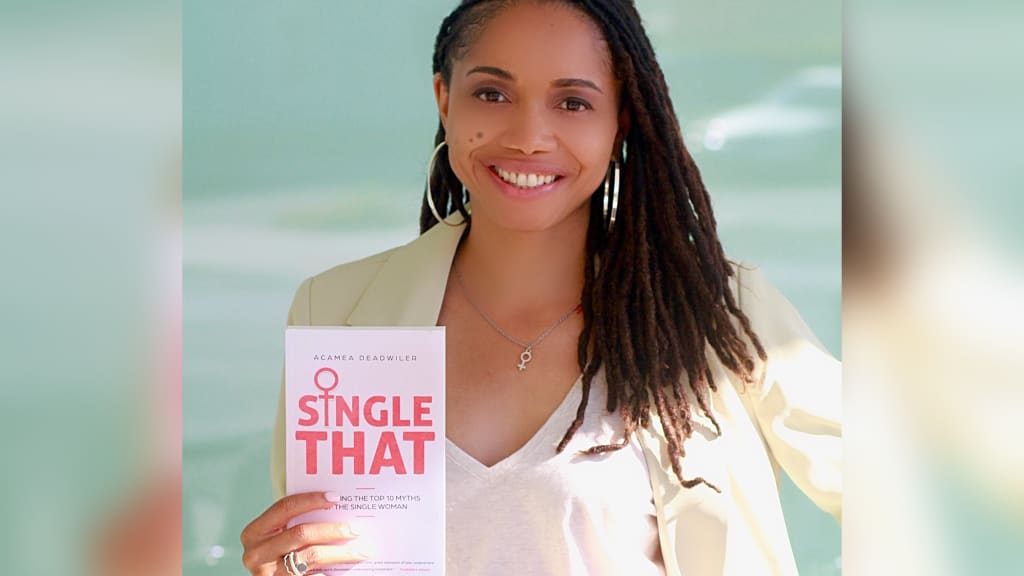Accidental Shero
The effects of writing about something bigger than you.

I called my cousin into the kitchen. She’d been staying with me while working to establish herself in the entertainment arts industry. I knew she’d understand chasing dreams that seem out of reach to most people.
Having published a self-help book only weeks ago about trusting the timing of your life, I called my cousin in to talk about the idea for my next book. It was kind of like, ok, I got that out of the way to clear a path for the most necessary thing I'll have ever written—at least to this point. She scrunched her eyebrows like you do when you’re thinking hard to try and make a scenario make sense.
“I’m happy I published that book,” I told her. “It was something I wanted to express. But the next one is going to be THE one.”
The idea had been bubbling inside of me, to a point past containment. It was on my mind even as I completed my current book. I didn’t intend to gloss over the significance of my latest release. I just knew the words stuck in my head were demanding immediate freedom. The task at hand wouldn't let me rest.
I told my cousin how the book I'd started writing would help so many women, and because of this, because it was urgent and pertinent and purposeful—it would become the most commercially successful of all my books.
My previous works were about personal life experiences.
I shared my stories in hopes that what I'd overcome would encourage others to persevere. But I mostly wrote to release. It was a form of self-therapy. If my sharing inspired others, it was a bonus. This time, I was writing with a primary objective to be of service.
My cousin leaned forward to rest her elbows on the island in the center of my kitchen. She was intrigued. She wanted to hear more, and I obliged. Then she agreed, my next book would be relatable on levels I hadn’t yet reached.
I wrote Single That: Dispelling the Top 10 Myths of the Single Woman because I wanted to change the often-negative narrative about women who are unwed and partnerless—especially women older than 30. Such women are too casually declared spinsters, future old maids, or irrevocably broken somehow.
The book's overarching theme is to encourage women to detach their sense of self-worth from their relationship status. Because it's not just men who apply negative connotations to long-time single ladies, women do it to other women. We do it to ourselves.
If a woman is single and has been for longer than deemed normal, we try to figure out what’s wrong with her. We question her and treat finding a romantic partner as the solution to a problem in dire need of solving. Every other aspect of her being is overshadowed.
There was a time when I couldn’t go anywhere with a particular friend without my singleness dominating the conversation. If I went to a networking event, it was “hey, my single friend’s here!” Not, “hey, my published writer and accomplished journalist friend is here!” The mission became finding someone to hook me up with instead of prospecting network opportunities.
Again, snagging a significant other is assumed to take precedence over all else in a woman’s life.
I've seen women threatened with the idea of being single. Advised to heed warnings such as, stop listening to your single friends before you end up “like them.” It's as though the single friends are in a circumstance so undesirable that other women should avoid it no matter the cost. As though having even a terrible someone is superior to having no one.
All of this contributes to a woman feeling better or worse about herself based entirely on her relationship status. It leads to tethering self-esteem to the state of our love lives. Partners are touted as prizes won and symbols of our worthiness.
Because media, tradition, and societal standards have taught us that women should aspire to marriage, not being on this path can make even confident women feel insecure. Some of the insecurities are projected onto us by other people. Their incessant questioning and expressions of concern make it challenging to remain content and self-assured, with or without a partner.
The idea of romantic companionship and love as a source of fulfillment isn’t lost on me. Sharing your journey with someone can be a blissful experience. It’s just, a woman is so much more than a relationship status. She does so much more worthy of celebration than have kids or become a wife. She doesn’t hold a smaller space in the world than her wed counterparts.
The sentiment sounds like a no-brainer.
I think most would agree that a woman is her own innately valuable person. Yet, our diminishing behavior as a society and the way that we group women based on relationship status says otherwise.
We even connect a woman’s title to her marital standing. She can be a Ms., Miss, or Mrs., based on this criterion. While a man is a “Mr.” irrespective of whether he binds himself to a partner, we've historically put women into corresponding boxes.
When a man is single, he's a bachelor who's just having fun and not ready to settle down. When it's a woman, she's bitter, an ice queen, or profoundly lonely. She can't just be single, and certainly can’t enjoy it.
I felt someone needed to address this toxic narrative and help disconnect the idea of who a woman is from who she’s with. Someone needs to help preserve the space where every young girl who will one day be a woman deserving of empowered existence feels like enough. I designated myself, someone.
I published Single That in September 2019.
It's gone on to achieve critical acclaim from Publishers Weekly, become an Amazon bestseller, provide the foundation for my featured TEDx talk, and allow me to contribute to an article for Cosmopolitan.
So many women have left reviews or reached out to tell me that the book helped increase their sense of self-worth. Men have said that it gave them a more evolved perspective and a desire to be extra mindful of how they approach women. Followers encouraged me to launch a one-on-one coaching membership to offer more in-depth insights. I’ve also had therapists recommend Single That to their patients.
One of the most delicious and unexpected responses to Single That has been the messages I receive on social media from young ladies who say they look up to me. I anticipated that it would resonate with those who’d reached the age where marriage and children came to be expected. But the younger generation has chimed in, expressing that I gave them permission to deviate from cultural and familial assumptions in building the life they imagine.
As I grew from a girl to a woman, I longed to carry the beautiful burden of being someone's hero. This was mainly because I never found the one I was searching for and wanted to fill that void for someone else. I never felt I had anyone to lift me up, hold my hand, push me forward, and instill in me hope for a better tomorrow.
As I got older and saw others knocked off pedestals by the same people who put them there, the idea became less appealing. I can't carry the weight of other's expectations or hang my heart on external approval. I'll settle for being a person who makes you feel seen.
With Single That, I set out to help us uplift ourselves by emboldening women. I didn't seek to become anyone’s voice or champion. I’m not uniquely courageous or of enviable strength. I’m only someone who’s found her passion and purpose yet is still learning and falling and picking herself up again.
To me, the work is the hero. I feel fortunate to be but a vessel who aims to carry it further.
About the Creator
Acamea Deadwiler
Acamea is the author of the critically acclaimed book,Single That: Dispelling the Top 10 Myths of the Single Woman She is also a TEDx speaker who has been featured on the FOX TV talk show, MORE. Acamea currently resides in Las Vegas, NV.






Comments
There are no comments for this story
Be the first to respond and start the conversation.